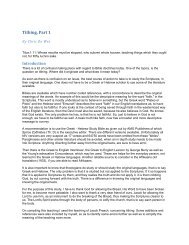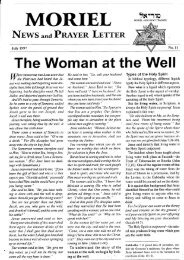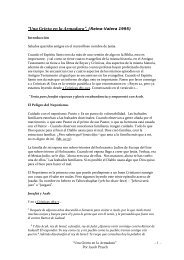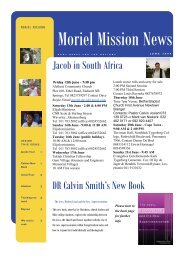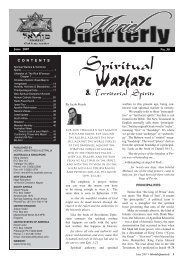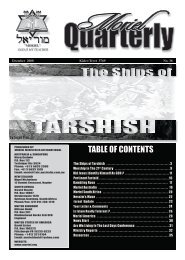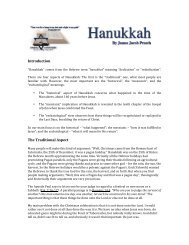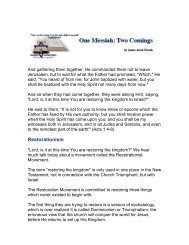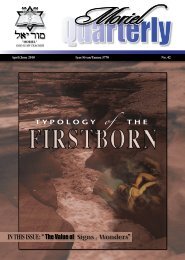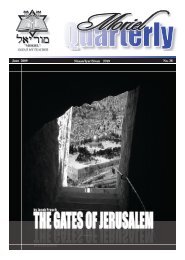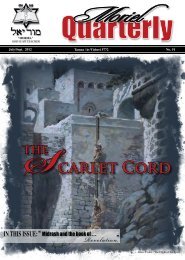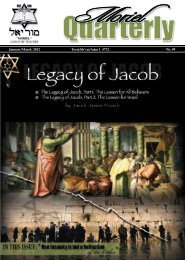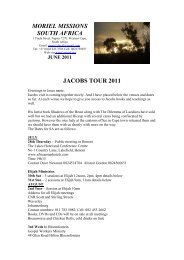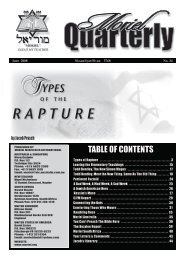The Wedding Feast (~19.49) - Moriel Ministries
The Wedding Feast (~19.49) - Moriel Ministries
The Wedding Feast (~19.49) - Moriel Ministries
Create successful ePaper yourself
Turn your PDF publications into a flip-book with our unique Google optimized e-Paper software.
Feature Article<br />
Jacob Prasch<br />
PARABLE<br />
of<br />
“<strong>The</strong> <strong>Wedding</strong> <strong>Feast</strong>”<br />
Jesus spoke to them again in parables, saying . . .<br />
Jesus spoke to them again in parables,<br />
saying, “<strong>The</strong> kingdom of heaven<br />
may be compared to a king who gave<br />
a wedding feast for his son. And he<br />
sent out his slaves to call those who<br />
had been invited to the wedding feast,<br />
and they were unwilling to come.<br />
Again he sent out other slaves saying,<br />
‘Tell those who have been invited,<br />
“Behold, I have prepared my dinner;<br />
my oxen and my fattened livestock are<br />
all butchered and everything is ready;<br />
come to the wedding feast.”’ But they<br />
paid no attention and went their way,<br />
one to his own farm, another to his<br />
business, and the rest seized his slaves<br />
and mistreated them and killed them.<br />
But the king was enraged, and he sent<br />
his armies and destroyed those murderers<br />
and set their city on fire. <strong>The</strong>n<br />
he said to his slaves, ‘<strong>The</strong> wedding<br />
is ready, but those who were invited<br />
were not worthy. ‘Go therefore to the<br />
main highways, and as many as you<br />
find there, invite to the wedding feast.’<br />
Those slaves went out into the streets<br />
and gathered together all they found,<br />
both evil and good…<br />
…that is interesting, “both evil and<br />
good”…<br />
…and the wedding hall was filled with<br />
dinner guests. But when the king came<br />
in to look over the dinner guests, he<br />
saw a man there who was not dressed<br />
in wedding clothes, and he said to<br />
him, ‘Friend, how did you come in<br />
here without wedding clothes?’ And<br />
the man was speechless. <strong>The</strong>n the<br />
king said to the servants, ‘Bind him<br />
hand and foot, and throw him into<br />
the outer darkness; in that place<br />
there will be weeping and gnashing<br />
of teeth.’ For many are called, but<br />
few are chosen.” (Matthew 22:1-14)<br />
In order to understand this parable of<br />
the Kingdom, we have to understand the<br />
Jewish wedding tradition at the time of Jesus.<br />
In Judaism, the time of Jesus is called<br />
“<strong>The</strong> Second Temple Period.” At a Jewish<br />
wedding in Jesus’ time there were three<br />
phases. Whenever looking at the historical<br />
and cultural setting of a biblical passage,<br />
this is something theologians call “Sitz im<br />
Leben,” a German term. This means looking<br />
at the life setting of the situation. Unless<br />
we do that we cannot understand what<br />
Jesus is talking about. <strong>The</strong> wedding had<br />
three phases:<br />
betrothal<br />
nuptial<br />
consummation<br />
All three were important for the wedding<br />
to be valid. For the marriage to be<br />
valid, all three needed to be completed.<br />
This also directly addresses the consequences<br />
of the Roman Catholic doctrine<br />
that Mary was perpetually a virgin. To say<br />
Joseph and Mary had an unconsummated<br />
marriage would have meant that they were<br />
not legally married by Jewish law. It would<br />
have meant that Jesus, in effect, grew up out<br />
<strong>Moriel</strong> Quarterly • December 2009




